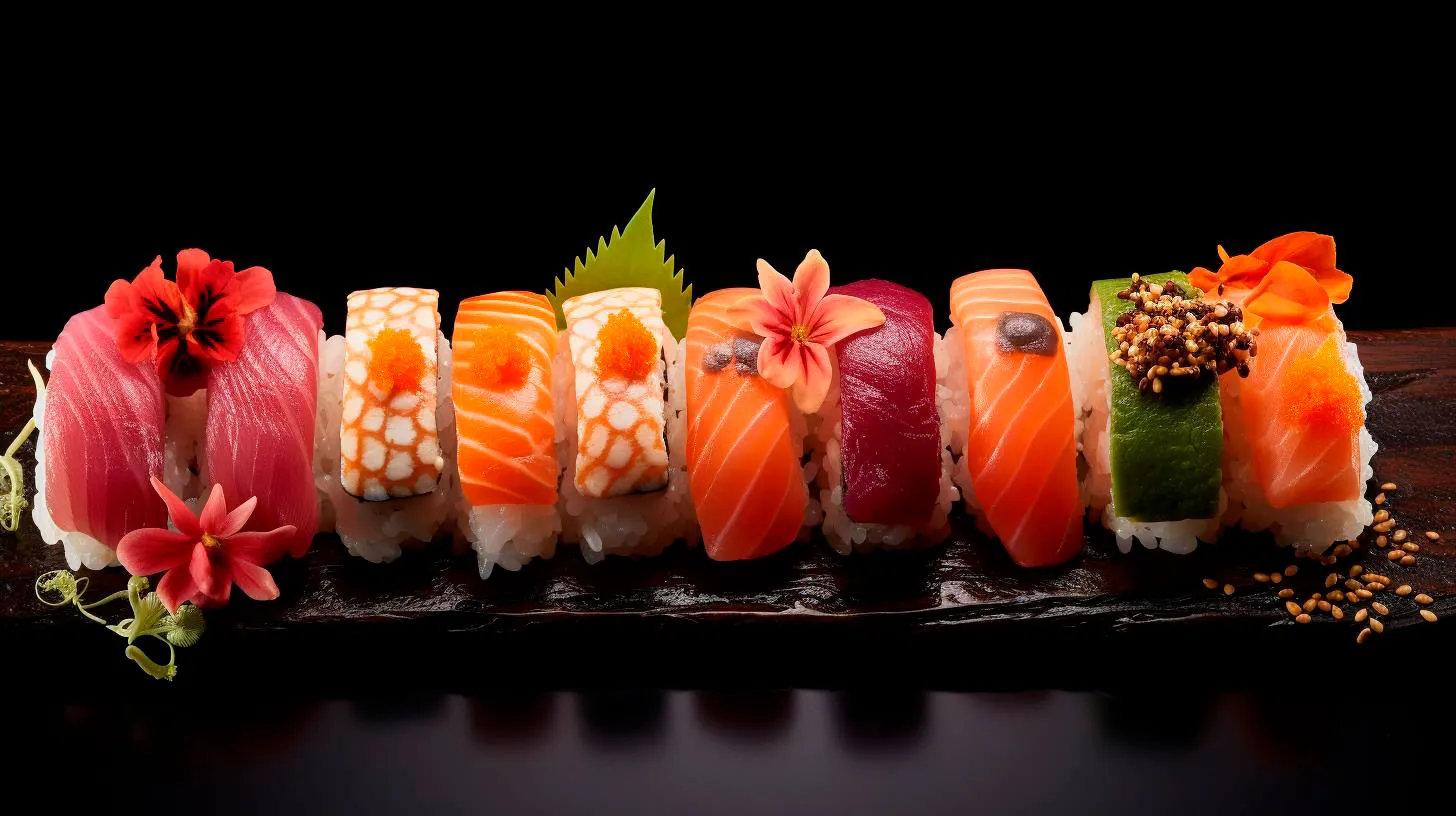Elevating Flavors: Unleashing the Potential of Sushi Rice Vinegar
The secret lies in the transformative power of sushi rice vinegar. In this article, we will explore the fascinating world of sushi rice vinegar, its significance in sushi making, and how it can elevate your culinary creations to new heights.
The Essence of Sushi Rice Vinegar
Sushi rice vinegar, also known as sushi-su or simply rice vinegar, forms the basis of sushi rice, the foundation for any sushi dish. It is a type of vinegar made by fermenting rice, resulting in a mild, slightly sweet, and tangy flavor profile. This unique vinegar is essential in creating the perfect balance of taste in sushi and plays a vital role in enhancing the overall dining experience. Let’s dive deeper into the reasons why sushi rice vinegar deserves special attention.
1. Enhancing Flavor
Sushi rice vinegar acts as a flavor enhancer, giving sushi rice its distinct taste. The combination of sweet and tangy notes from the vinegar complements the natural flavors of other sushi ingredients, such as fish, vegetables, and seaweed. It balances the umami flavors, creating a harmonious blend that tantalizes the taste buds. Using high-quality sushi rice vinegar can make the difference between a good sushi roll and an exceptional one.
2. Creating Balance
The acidity in sushi rice vinegar not only adds flavor but also plays a crucial role in balancing the taste of sushi. The vinegar prevents the rice from becoming too heavy and lends a refreshing quality to the dish. Creating a delicate equilibrium between the vinegar, rice, and other ingredients is vital to ensure a well-balanced sushi experience.
3. Preserving Freshness
In addition to flavor enhancement, sushi rice vinegar has natural preservative properties that help extend the shelf life of sushi rice. It inhibits the growth of harmful bacteria, keeping the rice fresh and safe to consume. This not only contributes to food safety but also allows for better meal planning and storage of leftovers.
4. Nutritional Benefits
While the primary purpose of sushi rice vinegar is culinary, it also offers various nutritional benefits. Rice vinegar is low in calories and fat, making it a healthier alternative to other dressings or sauces. It contains acetic acid, which aids digestion and helps control blood sugar levels. Incorporating sushi rice vinegar into your sushi dishes not only enhances the taste but can also contribute to a balanced and nutritious diet.
Unleashing the Potential of Sushi Rice Vinegar
Now that we understand the importance of sushi rice vinegar let’s explore some ways you can unleash its true potential to take your sushi creations to the next level.
1. Choose the Right Sushi Rice Vinegar
Investing in high-quality sushi rice vinegar is essential to achieve exceptional results. Opt for vinegar made from fermented rice, with a well-balanced flavor and aroma. Consider brands that prioritize traditional brewing techniques to ensure an authentic and superior product.
2. Experiment with Flavor Infusions
While traditional sushi rice vinegar offers incredible flavor, feel free to get creative with flavor infusions. Infusing the vinegar with ingredients like ginger, garlic, or citrus can add an intriguing twist to your sushi rice. Experiment with different combinations to find your unique flavor profile.
3. Use Sushi Rice Vinegar Beyond Sushi
Sushi rice vinegar’s versatility extends beyond sushi. It can be used as a dressing for salads, marinades for proteins, or a flavorful addition to pickled vegetables. Its tangy and refreshing taste can enliven various dishes and give them a touch of Japan.
4. Elevate Your Sushi Plating
The visual aspect of sushi is just as important as its taste. Drizzling some sushi rice vinegar over your sushi rolls or nigiri can add a glossy sheen, enhancing the overall presentation. It not only makes your sushi visually appealing but also delivers an extra burst of flavor with every bite.
Key Takeaways
Sushi rice vinegar is undoubtedly the unsung hero behind the extraordinary flavors of sushi. It enhances the taste, brings balance, and preserves freshness, elevating your culinary creations. Remember these key takeaways to make the most of sushi rice vinegar:
- Sushi rice vinegar enhances flavors, creating a well-balanced and refreshing taste.
- Invest in high-quality sushi rice vinegar for exceptional results.
- Experiment with flavor infusions to create your unique sushi rice profile.
- Discover the versatility of sushi rice vinegar by using it in various dishes.
- Don’t forget the power of presentation – drizzle sushi rice vinegar for an extra touch of flavor and shine.
With sushi rice vinegar in your culinary arsenal, you have the secret ingredient to take your sushi creations from ordinary to extraordinary. Explore the endless possibilities, unleash your creativity, and embark on a flavorful journey through the rich world of sushi rice vinegar.
Modernizing Classic Recipes: The Versatility of Sushi Rice Vinegar
In this article, we will explore the versatility of sushi rice vinegar, its benefits, and how it can help you modernize classic recipes.
What is Sushi Rice Vinegar?
Sushi rice vinegar is a type of vinegar made from fermented rice and is an essential component of sushi rice. It has a delicate, mildly sweet, and tangy flavor that perfectly complements the freshness of raw fish. Traditionally, it is made by mixing rice, water, and a type of mold called koji, which ferments the rice. The resulting liquid is then combined with sake, salt, and sugar to create sushi rice vinegar.
Versatility and Benefits of Sushi Rice Vinegar
While sushi rice vinegar is a staple in Japanese cuisine, its versatility extends far beyond sushi. Here are some of the key benefits and features that make sushi rice vinegar a valuable ingredient in your kitchen:
1. Flavor Enhancer
Sushi rice vinegar adds a delightful tanginess to dishes that can enhance their overall flavor profile. Its subtle sweetness and acidity work wonders in balancing rich and savory flavors, making it an excellent addition to dressings, marinades, and sauces.
2. Tenderizer
The mild acidity of sushi rice vinegar acts as a natural tenderizer for proteins such as chicken, beef, or fish. Incorporating it into marinades or using it as a brine can help break down tough fibers, resulting in more tender and flavorful meat.
3. Pickling Agent
Historically, vinegar has been used as a natural preservative. Similarly, sushi rice vinegar can be used as a pickling agent to preserve vegetables, fruits, and even seafood. The tangy flavor it imparts adds depth to pickled ingredients, making them a refreshing addition to salads, sandwiches, or a tasty side dish.
4. Health Benefits
In addition to its flavorful qualities, sushi rice vinegar also offers several health benefits. It is known to aid in digestion, improve metabolism, and regulate blood sugar levels. Furthermore, it is low in calories and fat, making it a healthier alternative to some traditional condiments.
Modernizing Classic Recipes with Sushi Rice Vinegar
Now that we understand the versatility and benefits of sushi rice vinegar, let’s explore how this ingredient can breathe new life into classic recipes:
1. Sushi Rice Variations
Sushi rice vinegar is the key ingredient that gives sushi rice its distinct flavor. However, you can experiment with different types of vinegar, such as black rice vinegar or raspberry vinegar, to create unique and modernized versions of sushi rice. This allows you to infuse a new depth of flavor into traditional sushi rolls or sashimi bowls.
2. Flavorful Salad Dressings
Incorporate sushi rice vinegar into your salad dressings to add a tangy twist to your greens. Mix it with olive oil, soy sauce, and a hint of honey for a delicious and refreshing dressing that complements both leafy and grain-based salads.
3. Fusion Marinades
Upgrade your marinades for meats or vegetables by introducing sushi rice vinegar into the mix. Combine it with soy sauce, ginger, garlic, and a touch of sesame oil to create an Asian-inspired marinade that infuses your proteins with a delightful umami flavor.
4. Pickles with a Twist
Take your pickles to the next level by using sushi rice vinegar as a pickling agent. Experiment with different vegetables, fruits, or even seafood to achieve unique flavor combinations. Try pickling cucumbers, radishes, or mangoes with sushi rice vinegar for a refreshing and tangy snack or side dish.
5. Refreshing Beverages
Sushi rice vinegar can even be used to create refreshing beverages. Mix it with sparkling water, a splash of fruit juice, and a sweetener of your choice to create a unique and tangy mocktail that will impress your guests.
Conclusion
Sushi rice vinegar is a versatile ingredient that deserves a place in every modern kitchen. Its ability to enhance flavors, tenderize proteins, and preserve ingredients makes it an invaluable addition to classic recipes. By embracing the versatility of sushi rice vinegar, you can breathe new life into traditional dishes and create unique culinary experiences that will surprise and delight your taste buds.
Culinary Innovations Embracing Sushi Rice Vinegar for Reinventing Classics
In this article, we explore the culinary innovations that have embraced sushi rice vinegar and how it is transforming classic dishes for a delightful gastronomic experience.
What is Sushi Rice Vinegar?
Sushi rice vinegar, also known as seasoned rice vinegar, is made by adding salt and sugar to rice vinegar. It has a delicate balance of sweet, salty, and tangy flavors, which adds depth and complexity to dishes. This vinegar is an essential component of making sushi rice, as it not only provides flavor but also helps in preserving the rice and preventing bacterial growth. However, its uses go beyond sushi and have been increasingly utilized by chefs in various cuisines around the world.
Innovations in Traditional Dishes
Chefs have been experimenting with sushi rice vinegar to reimagine classic dishes, offering a delightful twist that adds an unexpected burst of flavor. Here are some notable examples:
-
Sushi Rice Vinegar Pickled Vegetables
By pickling vegetables in sushi rice vinegar, chefs are elevating the traditional pickling process. The combination of tanginess from the vinegar and the natural sweetness of the vegetables creates a harmonious balance. These pickles add a refreshing element to dishes and are the perfect accompaniment to grilled meats or served as a side dish.
Key Takeaway: Sushi rice vinegar pickled vegetables offer a tangy and sweet twist to traditional pickling, enhancing the overall flavor profile of dishes.
-
Sushi Rice Vinegar Infused Desserts
The sweetness of sushi rice vinegar makes it an ideal ingredient for infusing into desserts, where it can replace traditional vinegars or citrus flavors. From incorporating it into creams and custards to drizzling it over fruits, chefs are creating unique dessert experiences. The tangy undertones of the vinegar add an exquisite contrast to the sweetness, taking desserts to a whole new level.
Key Takeaway: Sushi rice vinegar-infused desserts offer a delightful balance of sweet and tangy flavors, creating an innovative and memorable dessert experience.
-
Sushi Rice Vinegar-Based Dressings and Marinades
Sushi rice vinegar has become a go-to ingredient for creating flavorful dressings and marinades. Its delicate balance of flavors provides a perfect base for enhancing salads, marinades for meats, or even drizzling over roasted vegetables. Chefs are utilizing its versatility and unique flavor profile to create exceptional culinary creations that elevate the dining experience.
Key Takeaway: Sushi rice vinegar-based dressings and marinades offer a versatile and tangy twist to traditional recipes, enhancing the overall taste and experience of the dish.
The Health Benefits and Culinary Appeal
Apart from its culinary versatility, sushi rice vinegar also offers health benefits. It is low in calories, fat-free, and contains acetic acid, which has been associated with various health benefits, including improved digestion and blood sugar control. Additionally, its refreshing and tangy flavor profile adds a delightful touch to dishes, making them more appealing to the palate.
Final Thoughts
The culinary world is constantly evolving and embracing new ingredients to reinvent classic dishes. Sushi rice vinegar has emerged as a versatile ingredient that adds a unique twist to traditional recipes, inspiring chefs to create memorable culinary experiences. Whether it’s through pickled vegetables, infused desserts, or dressings and marinades, sushi rice vinegar offers a tangy and sweet flavor profile that enhances dishes in delightful ways. With its health benefits and culinary appeal, this culinary innovation is here to stay.
Fusion Cuisine: Transforming Traditional Dishes with Sushi Rice Vinegar
Traditionally used in Japanese cuisine, sushi rice vinegar is now being incorporated into a wide range of dishes from various cultures. Its unique flavor profile and versatile nature have made it a favorite among both professional chefs and home cooks seeking to bring new dimensions to their meals.
1. The Versatility of Sushi Rice Vinegar
Sushi rice vinegar is made by fermenting rice, resulting in a subtly sweet and sour flavor that adds depth to any dish. Its versatility lies in its ability to complement a variety of ingredients, allowing it to seamlessly merge flavors from different cuisines. Some popular examples of fusion dishes featuring sushi rice vinegar include:
- Mexican Sushi Rolls: A delicious blend of traditional Mexican ingredients like avocado, jalapenos, and cilantro, rolled into sushi using sushi rice and a splash of sushi rice vinegar for an extra kick.
- Korean Bibimbap Sushi Bowl: A fusion of Korean bibimbap and sushi, this dish combines sushi rice seasoned with sushi rice vinegar with traditional bibimbap ingredients such as vegetables, meat, and a spicy gochujang sauce.
- Italian Sushi Bruschetta: An innovative take on the classic Italian bruschetta, this fusion dish features sushi rice seasoned with sushi rice vinegar as a base for toppings like fresh tomatoes, basil, and mozzarella.
These examples demonstrate just a few of the endless possibilities that arise when sushi rice vinegar is used as a key ingredient in fusion cuisine. Its tangy yet delicate flavor provides a harmonious balance when combined with ingredients from different culinary traditions.
2. Health Benefits of Sushi Rice Vinegar
Besides its culinary advantages, sushi rice vinegar also offers various health benefits. It is low in calories, making it a suitable ingredient for individuals looking to manage their weight. Additionally, it contains essential amino acids, which are important for maintaining proper bodily functions.
Sushi rice vinegar is also known for its antimicrobial properties, which help inhibit the growth of harmful bacteria. This can contribute to better digestion and overall gut health. Incorporating sushi rice vinegar into your meals not only enhances the flavors but also boosts the nutritional value of your dishes.
3. Key Takeaways
As fusion cuisine continues to evolve, sushi rice vinegar emerges as a versatile and exciting ingredient. By incorporating the tangy flavor of sushi rice vinegar into traditional dishes, chefs and home cooks alike can create unique and delicious fusion meals. To summarize, here are the key takeaways:
- Sushi rice vinegar adds depth and dimension to fusion cuisine.
- It can be used in a wide range of dishes from different cultures.
- Sushi rice vinegar offers health benefits such as low calorie content and antimicrobial properties.
- Experimenting with sushi rice vinegar opens up endless possibilities for culinary creativity.
So why not give your next culinary adventure a twist with a dash of sushi rice vinegar? Embrace the fusion cuisine trend and explore the delightful flavors that sushi rice vinegar brings to the table!



